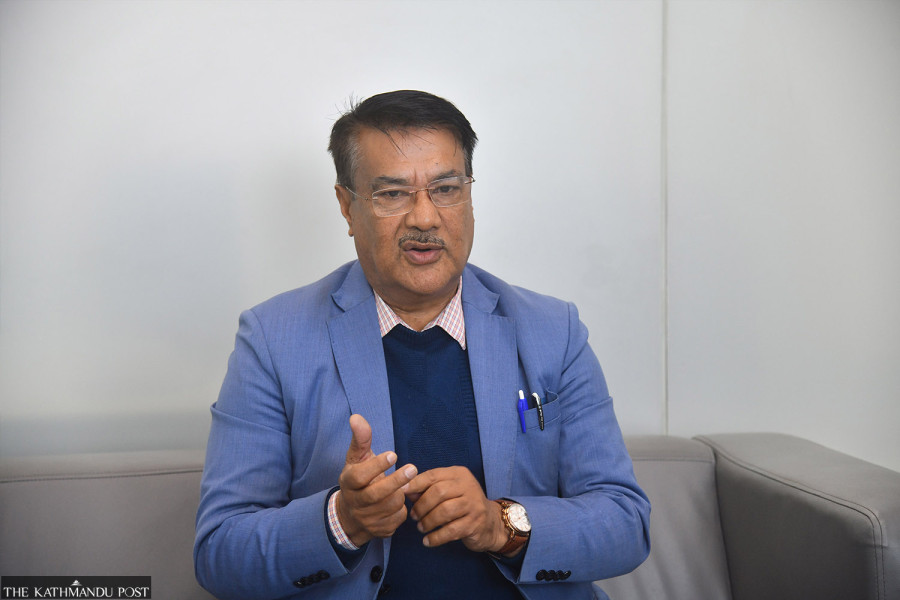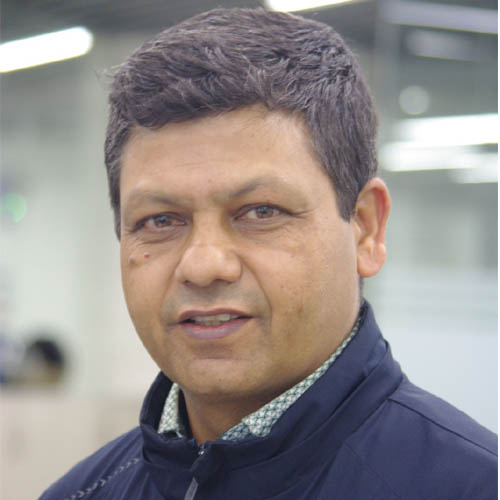Interviews
Gagan Thapa realised lack of support for his anti-coalition agenda
We fielded Krishna Sitaula as National Assembly candidate from Koshi only after reaching an understanding among coalition partners that he would be the upper house chair.
Thira Lal Bhusal, Anil Giri & Binod Ghimire
Nepali Congress convened its Mahasamiti meeting last week where some crucial issues were discussed. But in the end the meeting couldn’t come up with clear decisions, as it passed the buck to the Central Working Committee. The most hotly debated issue concerned whether the party should continue to have pre-poll alliances. This was despite the hectic negotiations between the party establishment and rival factions behind the curtains. In this context, Thira Lal Bhusal, Anil Giri and Binod Ghimire of the Post sat with Min Bishwakarma, chief of the party’s publicity department, to understand what transpired.
Nepali Congress’s Mahasamiti meeting has just concluded. What exactly did it achieve?
The Mahasamiti meeting is mandated to discuss party policies and make changes in its statute as well. There were three major proposals to discuss. The first was named ‘overall policy’ that encompassed the country’s political, economic, social, foreign affairs, education and employment aspects. Party vice president Purna Bahadur Khadka presented that proposal. Second was a report on the party organisation, which was presented by general secretary Gagan Thapa and the third was on contemporary issues presented by the other general secretary Bishwa Prakash Sharma. Of the 2,373 participants, 631 aired their views on the issues. In the past, hardly 100 participants got a chance to speak in the event. This was a positive aspect of the Mahasamiti meeting this time.
It seems the discussion was dominated by a single issue of whether Congress should opt for electoral alliances.
At the beginning, General Secretary Thapa raised the issue on whether or not to forge a poll alliance. That obviously made participants take a position for and against the idea. There were some who stressed that the party should be clear on when it should have such an alliance and when it shouldn’t. Media coverage gave the impression that it was focused only on the single agenda. But that wasn’t the case. Other important issues were also discussed. For instance, the Mahasamiti discussed challenges posed by rampant corruption, anarchism, populism and public frustration.
General Secretary Bishwa Prakash Sharma’s proposal to fix the term for top state positions such as President, prime minister, ministers and lawmakers was another topic that drew many people’s attention. Didn’t it?
He floated the idea of one term for President, two terms for prime minister, three for ministers and four terms for lawmakers. It sounded simple and straight-forward. We also discussed this matter in a jest. If it is implemented, they [the proposers] themselves would be removed from many of these races. I don’t think the Central Working Committee will pass it as it is. This is because it may affect even second-rung leaders, who have ambitions to hold those positions.
In the decision, the meeting stated that we passed three major proposals in consensus, with the condition that the documents would be given a final shape by the Central Working Committee based on the feedback given by Mahasamiti members. We did so as the announcement of specific decisions may invite disputes while making changes in the CWC based on the feedback. Ahead of the meeting, there was an apprehension as to whether the Mahasamiti meeting would be held and concluded as per the schedule. But we amicably settled the issues and concluded the event in consensus.
But don’t you think it will be a challenge for the CWC to settle the issues?
They [Thapa-led faction] had expected to get huge support on the issue [of electoral coalition] from the floor of Mahasamiti. But the response they got has made them think differently. Otherwise, this issue wouldn’t be settled in such an easy way. They have shown some flexibility.
Of the 631 participants who aired their views, many spoke on different aspects of whether or not to have such coalitions. At last, the majority of members stood in favour of not wrangling over a strategic issue at the Mahasamiti, whose primary responsibility is to formulate party policies, not strategies. Whether to join hands with a particular party in an election is not a matter of policy, it is a strategy. Realising this, our colleagues showed flexibility and maturity.
Does that mean even the CWC may defer the decision without taking a concrete decision as such strategic decisions are made just ahead of the polls based on the situation at the time.
No, it will take a concrete decision in line with the agreement reached among the key leaders at the party president’s residence late night on Thursday, which is more diplomatic, indirect and conditional. Our friends including General Secretary Thapa have now realised this.
Is there differences between the two sides about the party’s calendar of key events including the date to convene next general convention?
Some leaders may demand early general convention, special general convention or the convention at the scheduled time. Congress statute states that the general convention should be held every four years. The party can seek one more year if there is a valid reason. The party can take an additional six months in special circumstances. There is not much difference between the leaders on this issue. General secretary Thapa wants to fix a timeline while the party president says it may not be prudent to schedule it so early.
A group of Congress leaders lobbied to raise the issue of reinstating Nepal as a Hindu state. Over 1,100 people have signed on their demand paper placed outside the Mahasamiti venue. Will the CWC take up this issue?
There is an interesting aspect. Those who are leading this campaign don’t have any religious or spiritual backgrounds. Their activities at present and past are pro-secular. Why would people back those who have no religious or spiritual norms and values, nor led any such organisation? If someone reputed and popular in that arena had raised the issue, it might have built pressure on the party. Majority of those who signed on the petition are not Mahasamiti members as anyone who reached the venue could have signed on it.
But did the group in your party join the pro-Hindu bandwagon seeing growing public sentiment in the agenda’s favour?
There is no such sentiment in our party. Our leadership however doesn’t dismiss this as ‘nothing’ as this issue has been repeatedly raised in party meetings. Therefore, the demand paper was received at the meeting and they were allowed to put their views as well. The Mahasamiti meeting didn’t accept the Hindu state revival as an agenda of the meeting as the Constitution of Nepal and the Congress statute don’t accept it.
There is also an allegation that the establishment tried to manoeuvre debates in its favour. Many participants were reportedly pressed to toe the establishment’s line.
Mahasamiti members are leaders themselves. Any time, they can be lawmakers or ministers. There is no need for such manoeuvring. In fact, since Sher Bahadur Deuba became party president, no decision has been taken based on minority or majority votes. They are all done with consensus. Even this time, if we go for a vote to decide on ‘the coalition issue’ the establishment has over 80 percent in its favour. The party president however isn’t for taking any decision through a vote. He wants to run the party smoothly and exit the leadership accordingly.
As someone close to Deuba, whom do you think he is grooming as his successor in the party?
He isn’t a leader like Girija Prasad Koirala, who groomed Sushil Koirala as his successor. But Sher Bahadur Deuba became party president with support of all sides in the party, and he too supports them. In the 13th general convention, he took support of Shashank Koirala and Krishna Prasad Sitaula. In the 14th convention, he got support from Ramchandra Paudel as well. I believe he doesn’t want to declare his successor too early. But he may make a decision just ahead of completing his tenure as Congress president.
Of late, Congress leaders have started to say time has come to review the present constitution. What provisions need revision?
One concern is about the electoral system. It makes getting a parliamentary majority difficult for any political party. The proportional representation system is also not being practised as per the spirit. It rather increased powerful leaders’ monopoly in the organisation. So, debates have started on this issue. In the meantime, there is another concern that starting a process to amend one of the provisions of the constitution may open Pandora’s Box as various sections of society have complaints with this statute. Therefore, this process shouldn’t be started without first reaching a clear understanding among major political forces.
What are the modalities discussed as options to reform the country’s electoral system?
Different options are being floated. For instance, constituency reservation or candidacy reservation. Instead of picking lawmakers from a list prepared by party leaders as is now being practiced, many have floated the idea of electing PR lawmakers directly from the people, by setting aside constituencies for specific clusters such as women, Dalit, indigenous communities or other sections where only the candidates from the clusters compete.
This will ensure representation of such communities while electing competent ones. Such reserved constituencies would be changed in different elections. Likewise, in candidacy reservation, a certain number of candidacies can be reserved for the said clusters like in the present system. The present system that gives chances mainly to those favoured by the party’s top leaders. Such persons corrupt the PR category.
It’s been months since Prime Minister Dahal wanted to reshuffle the Cabinet. He hasn’t been able to do so reportedly due to reluctance of Congress. What is the reality?
He has been continuously pushing for a Cabinet reshuffle but it’s becoming tough to change ministers. Many argue that the prime minister has to change all ministers if he really needs to do it. Otherwise, those who are removed will be tagged as incompetent. But the prime minister wants to retain some. So, the leaders are in a confusion on how to do that.
Congress and Maoist Centre seem to be at odds on the issue of picking the National Assembly chair. Both the parties have claimed the key post.
We fielded Krishna Sitaula as National Assembly candidate from Koshi only after reaching an understanding among coalition partners on making him the upper house chair. But the Maoist Centre leaders have expressed their dissatisfaction after the loss of a Maoist candidate in the other Koshi seat. These issues will be resolved through negotiations and he will be a consensus candidate from the ruling coalition.
Some recent happenings have sparked speculations that CPN-UML and Maoist Centre may join hands again. How confident are you about this coalition’s longevity?
As I worked closely with both the leaders, I find that they [Dahal and Deuba] share exceptional trust. I don’t think it will be easy to break their bond.




 13.12°C Kathmandu
13.12°C Kathmandu






.jpg&w=200&height=120)







